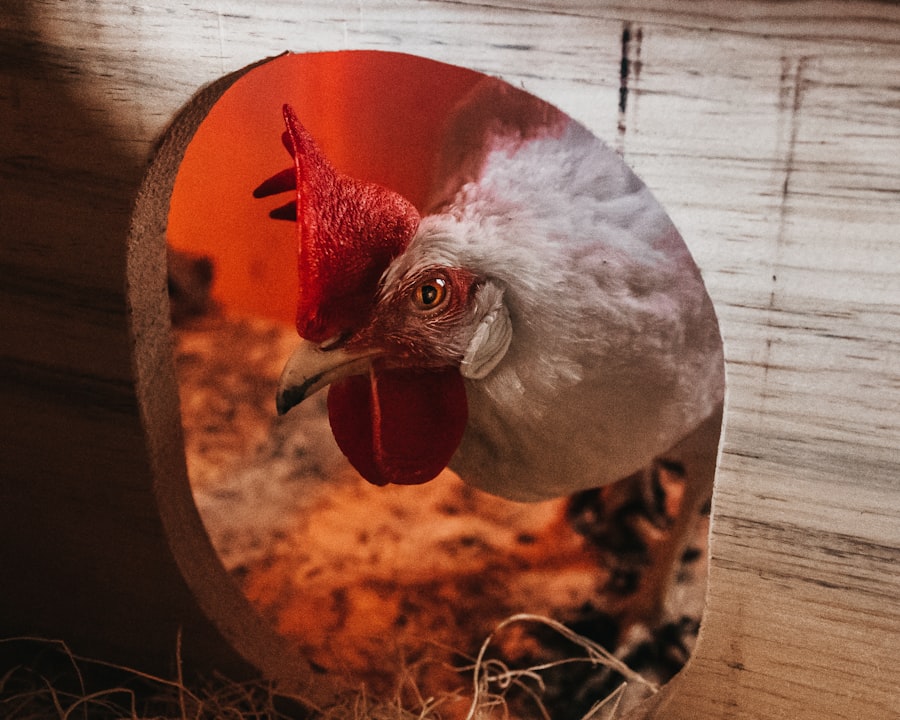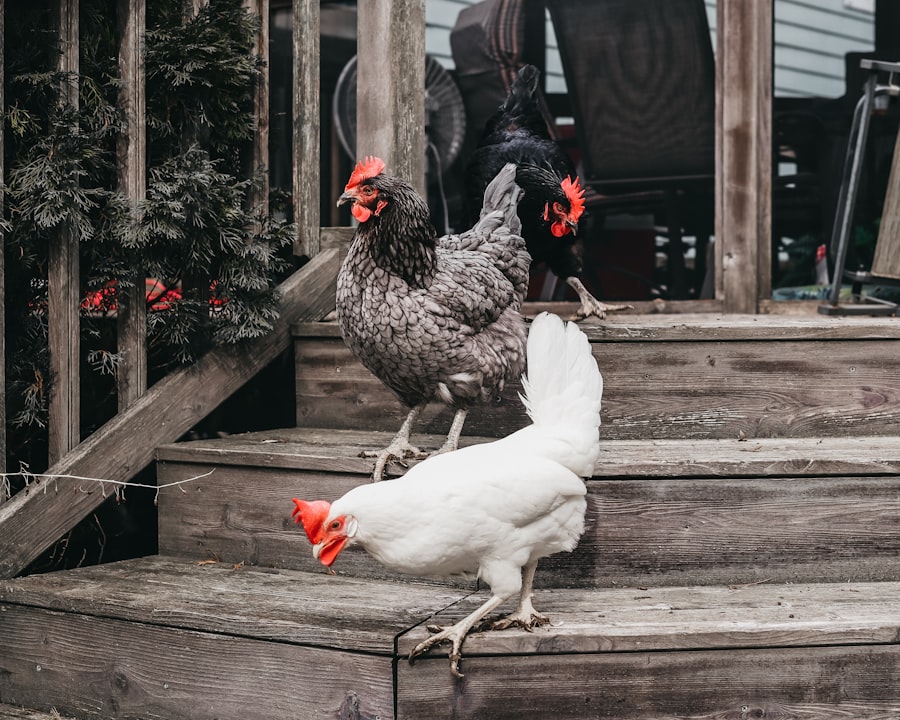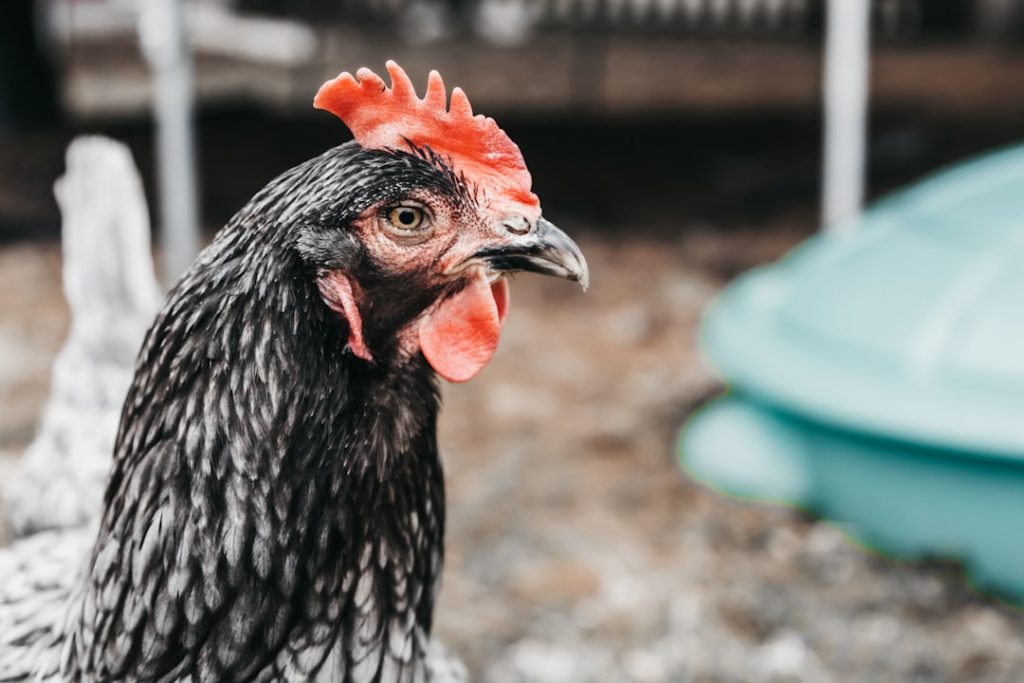When designing a chicken coop, several crucial factors must be considered to ensure the health and safety of the birds. The size of the coop is paramount, as chickens require ample space for movement and natural behaviors. A recommended guideline is to allocate 2-3 square feet of interior coop space per chicken and 8-10 square feet per bird in the outdoor run.
This space allocation promotes physical activity and mental stimulation, both essential for the chickens’ overall well-being. The coop’s layout and design are equally important. Adequate roosting bars should be provided for nighttime perching, and nesting boxes are necessary for egg-laying.
Proper ventilation is crucial to prevent the accumulation of ammonia from droppings, which can be detrimental to the chickens’ respiratory health. Additionally, the coop must be constructed to withstand potential predators, featuring robust walls and a secure entrance to protect against threats such as raccoons, foxes, and birds of prey. By incorporating these elements into the coop design, chicken owners can create a spacious, safe, and comfortable environment that promotes the health and contentment of their flock.
Table of Contents
- 1 Providing Nutritious and Varied Feed
- 2 Encouraging Natural Behaviors
- 3 Offering Enrichment Activities
- 4 Maintaining a Clean and Healthy Environment
- 5 Monitoring their Health and Well-being
- 6 Building a Positive Relationship with Your Chickens
- 7 FAQs
- 7.1 What are some signs that indicate a chicken is happy?
- 7.2 How can I provide a comfortable living environment for my chickens?
- 7.3 What kind of enrichment activities can I provide for my chickens?
- 7.4 What should I feed my chickens to keep them healthy and happy?
- 7.5 How can I ensure my chickens are safe from predators?
Key Takeaways
- Ensure your coop provides ample space and is secure to keep your chickens safe from predators.
- Offer a variety of nutritious feed to keep your chickens healthy and happy.
- Encourage natural behaviors like scratching, pecking, and dust bathing to keep your chickens active and engaged.
- Provide enrichment activities such as perches, toys, and treats to stimulate your chickens’ minds and bodies.
- Keep a clean coop and provide a healthy environment to prevent diseases and maintain your chickens’ well-being.
- Regularly monitor your chickens’ health and behavior to catch any issues early and provide proper care.
- Build a positive relationship with your chickens through gentle handling, regular interaction, and providing a stress-free environment.
Providing Nutritious and Varied Feed
The Importance of Commercial Feed
A good quality commercial chicken feed should form the basis of their diet, providing essential nutrients such as protein, carbohydrates, vitamins, and minerals. Look for a feed that is specifically formulated for laying hens if you have egg-laying chickens, as this will contain the right balance of calcium and other nutrients needed for strong eggshells.
Supplementing with Fresh Fruits and Vegetables
In addition to commercial feed, it’s important to supplement your chickens’ diet with fresh fruits and vegetables, as well as kitchen scraps such as leftover grains, bread, and pasta. This will not only provide additional nutrients and variety to their diet but also help reduce food waste. You can also offer treats such as mealworms or sunflower seeds as a special treat from time to time.
Avoiding Toxic Foods
Just be sure to avoid feeding them anything that is toxic to chickens, such as avocado or chocolate. By providing your chickens with a nutritious and varied diet, you will help ensure that they stay healthy and productive.
Encouraging Natural Behaviors

Chickens are natural foragers and enjoy scratching at the ground in search of insects and other tasty treats. To encourage this natural behavior, consider providing them with a designated area in their outdoor run where they can scratch and peck at the ground. You can scatter some scratch grains or mealworms for them to find, or simply let them loose in an area of bare soil where they can dig for bugs and worms.
Dust bathing is another important natural behavior for chickens, as it helps them keep their feathers clean and free from parasites. To encourage dust bathing, provide a shallow container filled with fine sand or dust where they can fluff up their feathers and roll around. This will not only help keep them clean but also provide them with enrichment and entertainment.
Chickens are natural foragers and enjoy scratching at the ground in search of insects and other tasty treats. To encourage this natural behavior, consider providing them with a designated area in their outdoor run where they can scratch and peck at the ground. You can scatter some scratch grains or mealworms for them to find, or simply let them loose in an area of bare soil where they can dig for bugs and worms.
Dust bathing is another important natural behavior for chickens, as it helps them keep their feathers clean and free from parasites. To encourage dust bathing, provide a shallow container filled with fine sand or dust where they can fluff up their feathers and roll around. This will not only help keep them clean but also provide them with enrichment and entertainment.
Offering Enrichment Activities
Just like any other pet, chickens benefit from enrichment activities that stimulate their minds and keep them entertained. One simple way to provide enrichment is by hanging a cabbage or other leafy greens from a string in their coop or run. This will not only give them something to peck at but also provide them with essential nutrients.
Another fun enrichment activity for chickens is setting up a mirror in their coop or run. Chickens are naturally curious creatures, and they will enjoy pecking at their reflection and interacting with the “other” chicken in the mirror. Just be sure to secure the mirror safely so that it doesn’t break or cause any harm to the chickens.
Just like any other pet, chickens benefit from enrichment activities that stimulate their minds and keep them entertained. One simple way to provide enrichment is by hanging a cabbage or other leafy greens from a string in their coop or run. This will not only give them something to peck at but also provide them with essential nutrients.
Another fun enrichment activity for chickens is setting up a mirror in their coop or run. Chickens are naturally curious creatures, and they will enjoy pecking at their reflection and interacting with the “other” chicken in the mirror. Just be sure to secure the mirror safely so that it doesn’t break or cause any harm to the chickens.
Maintaining a Clean and Healthy Environment
Keeping your chickens’ living environment clean is essential for their health and well-being. Regularly remove soiled bedding from the coop and replace it with fresh bedding to prevent the buildup of ammonia from their droppings. This will help keep the air inside the coop clean and reduce the risk of respiratory issues.
In addition to cleaning the coop, it’s important to regularly clean and refill their waterers and feeders to prevent the growth of harmful bacteria. Provide fresh water daily and clean their waterers regularly to ensure that they have access to clean drinking water at all times. Keeping your chickens’ living environment clean is essential for their health and well-being.
Regularly remove soiled bedding from the coop and replace it with fresh bedding to prevent the buildup of ammonia from their droppings. This will help keep the air inside the coop clean and reduce the risk of respiratory issues. In addition to cleaning the coop, it’s important to regularly clean and refill their waterers and feeders to prevent the growth of harmful bacteria.
Provide fresh water daily and clean their waterers regularly to ensure that they have access to clean drinking water at all times.
Monitoring their Health and Well-being

Visual Monitoring
Regularly observe your chickens’ behavior, appetite, egg production (if applicable), and overall appearance. This will help you identify any changes that could indicate illness or stress.
Hands-on Monitoring
In addition to visual monitoring, it’s essential to handle your chickens regularly. This allows you to check for any signs of injury or illness up close.
Monitoring Chicken Droppings
Get familiar with what healthy chicken droppings look like. This will enable you to quickly identify any abnormal changes, which could be a sign of illness or stress.
Building a Positive Relationship with Your Chickens
Building a positive relationship with your chickens is not only rewarding for you but also beneficial for them. Spend time sitting with them in their coop or run so that they get used to your presence and voice. Offer them treats from your hand so that they learn to trust you.
You can also try clicker training with your chickens, using positive reinforcement techniques to teach them simple commands or tricks. This not only provides mental stimulation for the chickens but also strengthens your bond with them. Building a positive relationship with your chickens is not only rewarding for you but also beneficial for them.
Spend time sitting with them in their coop or run so that they get used to your presence and voice. Offer them treats from your hand so that they learn to trust you. You can also try clicker training with your chickens, using positive reinforcement techniques to teach them simple commands or tricks.
This not only provides mental stimulation for the chickens but also strengthens your bond with them.
If you’re looking for more tips on how to keep your chickens happy, you might want to check out this article on 10 essential features for a chicken coop. It provides valuable information on creating a comfortable and safe environment for your feathered friends.
FAQs
What are some signs that indicate a chicken is happy?
Some signs that indicate a chicken is happy include active foraging, dust bathing, socializing with other chickens, and producing eggs regularly.
How can I provide a comfortable living environment for my chickens?
To provide a comfortable living environment for your chickens, make sure they have access to a clean and spacious coop, fresh water, nutritious food, and a secure outdoor area for foraging and dust bathing.
What kind of enrichment activities can I provide for my chickens?
You can provide enrichment activities for your chickens by offering them toys such as hanging treats, perches, and objects for pecking and scratching. Additionally, allowing them to free-range and explore their surroundings can also be enriching for them.
What should I feed my chickens to keep them healthy and happy?
To keep your chickens healthy and happy, feed them a balanced diet that includes a mix of grains, seeds, fruits, vegetables, and protein sources such as mealworms or kitchen scraps. Additionally, providing access to grit and oyster shells can help with their digestion and egg production.
How can I ensure my chickens are safe from predators?
To ensure your chickens are safe from predators, secure their coop with sturdy fencing, locks, and predator-proofing measures. Additionally, consider using motion-activated lights or alarms to deter predators from approaching the coop.
Meet Walter, the feathered-friend fanatic of Florida! Nestled in the sunshine state, Walter struts through life with his feathered companions, clucking his way to happiness. With a coop that’s fancier than a five-star hotel, he’s the Don Juan of the chicken world. When he’s not teaching his hens to do the cha-cha, you’ll find him in a heated debate with his prized rooster, Sir Clucks-a-Lot. Walter’s poultry passion is no yolk; he’s the sunny-side-up guy you never knew you needed in your flock of friends!







